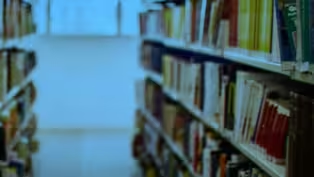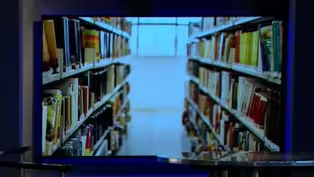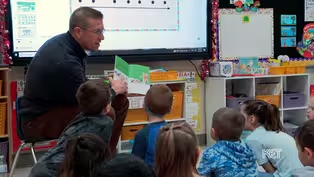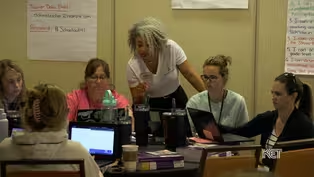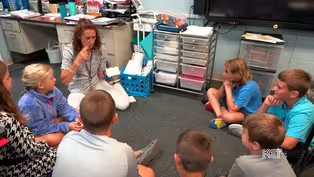
One Student’s Path to Better Reading
Clip: Season 2 Episode 127 | 4m 1sVideo has Closed Captions
The 2023 Kentucky School Report Card and a recent report by the National Assessment of ...
The 2023 Kentucky School Report Card and a recent report by the National Assessment of Educational Progress both showed more than half of Kentucky students are not proficient readers.
Problems playing video? | Closed Captioning Feedback
Problems playing video? | Closed Captioning Feedback
Kentucky Edition is a local public television program presented by KET

One Student’s Path to Better Reading
Clip: Season 2 Episode 127 | 4m 1sVideo has Closed Captions
The 2023 Kentucky School Report Card and a recent report by the National Assessment of Educational Progress both showed more than half of Kentucky students are not proficient readers.
Problems playing video? | Closed Captioning Feedback
How to Watch Kentucky Edition
Kentucky Edition is available to stream on pbs.org and the free PBS App, available on iPhone, Apple TV, Android TV, Android smartphones, Amazon Fire TV, Amazon Fire Tablet, Roku, Samsung Smart TV, and Vizio.
Providing Support for PBS.org
Learn Moreabout PBS online sponsorshipIn Kentucky.
There has already been a steady decline in reading levels over the last decade.
The 2023 Kentucky School report card and a recent report by the National Assessment of Educational Progress.
Both showed more than half of Kentucky students are not proficient readers.
And study shows students who have difficulty reading or more likely to struggle academically.
Our Kristi Dalton introduces us to one Jefferson County student who went through that struggle and shows us what put her on the path to being a better reader.
Myla is in third grade.
She's eight years old and she's making great strides academically, learning to read and thriving in school.
But that wasn't always the case.
There was a time when things were a lot harder.
Describe some of the clues that you got.
Those first clues that she might have some learning differences.
So, you know, I think we wondered about it early and then she's left handed whether that really means anything or not.
We don't really know.
But some of the teachers thought that maybe she was mirroring.
So she would write things backwards because she was mirroring what they were doing.
And so we kind of were watching, but we weren't kind of being all that aware to whether it was dyslexia or not until really until she went into first grade.
And there, you know, she came home and just her attitude started changing.
She was not thrilled to go to school anymore.
She knew that she wasn't picking up on everything as quickly as some of the other students.
And so when she was in the first grade, she brought home this book that she made.
And that was a bit of an aha moment.
Tell us that story.
So she had come home from school and they make a book where you write a script at the bottom and there's a picture.
And she was very proud that she had done that.
And so she came home from school and said, Mommy, I want to show you this book that I made.
So she got it out.
And then she wasn't able to read it.
And she was extremely frustrated because she had written it and then couldn't read the book at all.
So when you reached out for that diagnosis.
Tell us how that came about and how that felt.
I honestly wasn't expecting dyslexia diagnosis when we got her tested.
They said that she was seeing Hieroglyph that, you know, reading it was not at all.
There was no phonetic awareness in terms of seeing a letter and knowing what sound that makes.
And to know that your kiddo has been sitting in a classroom and seeing hieroglyphs and understanding that her peers are able to do things and understand things that she wasn't able to do was extremely overwhelming and sad.
So in the first grade, she moved from public elementary school to the departure school, which does specialize and in children and students that learn differently.
What kind of difference is that made for her that you.
Said night and day?
I mean, within a week of her being here, she was back to being happy and new.
Or wanted to go to school.
And to go to school.
Confidence.
So confidence.
And she's always had a lot of confidence.
And then understood that she may have dyslexia, but that doesn't define her.
And if anything, it's her superpower.
She's been given this wonderful gift of being incredibly creative.
And no matter how quickly you learned to read or how fast you can read, does not at all have any correlation with your intelligence.
So, you know, we're very thankful for for the school here at DePaul and and the differences in that they the way that they're able to teach differently here to meet to meet the children where they are.
It's just it's been it's like having our kid back and her she can read I mean which is amazing.
Kentucky’s Literacy Curriculum Requirements
Video has Closed Captions
Clip: S2 Ep127 | 6m 43s | Legislation passed last year requires all Kentucky school districts to adopt literacy ... (6m 43s)
Video has Closed Captions
Clip: S2 Ep127 | 3m 11s | When the General Assembly passed the Read to Succeed Act last year, this phonics-based ... (3m 11s)
Video has Closed Captions
Clip: S2 Ep127 | 4m 9s | "Real Men Read,” a United Way literacy initiative in Somerset, enlists role models who ... (4m 9s)
Teachers Learning to Teach Reading
Video has Closed Captions
Clip: S2 Ep127 | 2m 36s | Before the start of the school year, almost 3,000 Jefferson County teachers were ... (2m 36s)
“The Science of Reading” in Action
Video has Closed Captions
Clip: S2 Ep127 | 4m 44s | Hancock County has been teaching “the science of reading” for some time, allowing us to... (4m 44s)
Providing Support for PBS.org
Learn Moreabout PBS online sponsorship
- News and Public Affairs

Top journalists deliver compelling original analysis of the hour's headlines.

- News and Public Affairs

FRONTLINE is investigative journalism that questions, explains and changes our world.












Support for PBS provided by:
Kentucky Edition is a local public television program presented by KET
